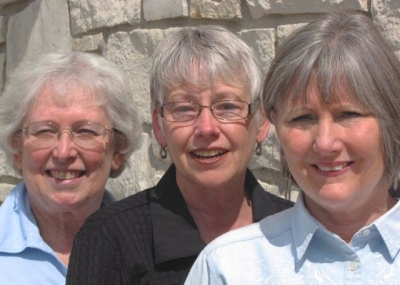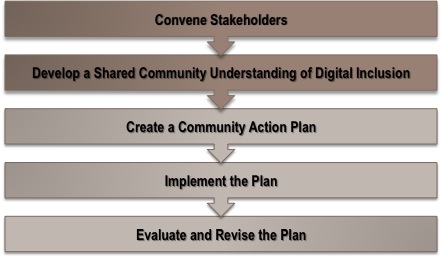Steps 1 and 2 of Building Digital Communities

Increasing information technology access and use in order to build cohesive 21st century communities is a complex task. Building Digital Communities: Framework for Action provides guiding principles and steps for getting started. Thanks to support from IMLS, Dodge City, Kansas has been convening stakeholders (step 1) and creating a shared understanding of digital inclusion (step 2). They will soon be creating a plan (step 3). Steps 4 and 5 are "implement the plan" and "evaluate and revise the plan".
Prior to convening stakeholders, Dodge City needed a local leadership team and needed to define who the stakeholders were.
Local Leadership Team
Knowing representatives from multiple sectors were needed to create local leadership teams, OCLC reached out to Cathy Reeves, Director of the Dodge City Public Library and asked her to identify someone from city government and someone from a nonprofit to serve with her. Cathy chose Jane Longmeyer, Director of Public Information at City of Dodge City and Greta Clark, Professor and Director of Multicultural Education at Dodge City Community College. All three have large personal networks, are enthusiastic about increasing information technology access and use in Dodge City and have the support of their supervisors.
Defining Stakeholders
Cathy, Jane & Greta agreed that convening stakeholders was a good idea but struggled with how to define stakeholders. They considered crafting a survey but were unsure what distribution method would result in a wide variety of community members participating. OCLC reached out to the Center for Digital Inclusion at the University of Illinois, Urbana-Champaign and WayMark Systems for stakeholder engagement expertise. OCLC, the Center for Digital Inclusion and WayMark Systems (we call the three of them "national support") provided the local leadership team with a digital inclusion stakeholder worksheet and provided guidance identifying potential stakeholders.
Convening Stakeholders
The Dodge City local leadership team completed the digital inclusion stakeholder worksheet resulting in a list of names, organizations, email addresses and postal addresses. The stakeholder list included local government, public agencies, business (including broadband service providers), community-based organizations (serving populations least likely to be internet users), health providers and related organizations, and individuals utilizing free broadband access or training. To ensure a broad list of stakeholder names, the local leadership team each completed the worksheet individually. OCLC merged the lists. The local leadership team then filled in gaps.
Step 1: Convene Stakeholders
Stakeholders were invited to four initial meetings held on April 24 and 25. Each meeting consisted of the same discussion questions and completion of an online stakeholder alignment survey. We held four meetings in order to accommodate schedules, resulting in 66 stakeholders attending the meetings. The meetings were all held at the Dodge City Public Library.
The online survey was also distributed to stakeholders who could not attend the meetings.
A full summit of stakeholders was held May 17. The summit was held at the Civic Center. We intentionally chose a different location than the initial meetings in order to reduce the possibility of the initiative being viewed as a library project. 55 stakeholders attended the summit.
For the in-person gatherings and the online survey, the local leadership team personally reached out to stakeholders to encourage their participation.
Step 2: Develop a Shared Community Understanding of Digital Inclusion
The online survey:
- Helped stakeholders understand the far reaching scope and impact of information technology access and use;
- Gathered their views of current information technology access and use in Dodge City versus what the community needed (within a variety of sectors);
- Served as an anonymous platform for stakeholders to note their or the community's reservations or concerns with potential digital inclusion efforts.
The discussion questions of the April 24-25 meetings were:
- In what ways has Dodge City achieved community members’ access and use of information technology?
- What challenges does Dodge City face in achieving full community access and use of information technology?
- What would success look like if all community members had access to and knew how to use information technology?
At the May 17 summit we reviewed the survey results and shared visions of success, resulting in formation of working groups.
Lessons Learned
- The local leadership team personally contacting invited stakeholders is essential.
- The local leadership team review of RSVPs to stakeholder meetings helped the Team to identify sectors not represented and key individuals who had not yet confirmed. They then reached out to fill gaps.
- Promotion of stakeholder meetings in the local media helped engage community members who care about the issue.
- The identity protected survey was important to identifying potential roadblocks and stakeholder concerns that were not voiced during the in-person stakeholder meetings.
- Continually adding stakeholders is essential but does slow the process of creating a shared understanding of digital inclusion.
Step 3: Create a Community Action Plan
We are now further defining working groups and their goals while also reaching out to stakeholders who are not as engaged as we would like. Each working group is being asked to set a visionary goal and an accessible demonstration project. The intent is to create a community wide plan through the working groups while using the demonstration projects to maintain excitement and interest.
Cathy Reeves, Director of Dodge City Public Library stated:
"They did not just tell us what to do, but worked with us as a team to make the stakeholder engagement process a learning process for us and an opportunity for the community to discuss digital inclusion and begin creating a plan that we as a community can actually make happen."

